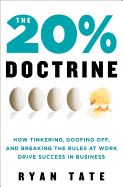
The subtitle of Ryan Tate's The 20% Doctrine--How Tinkering, Goofing Off, and Breaking the Rules at Work Drive Success in Business--may induce some head scratching: How could goofing off be good for business, let alone great? It all comes back to the main title, which refers to policies at some companies that encourage employees to devote one-fifth of their work time to projects that personally interest them, perhaps developing ideas that could become the next iPad. It was an approach famously pioneered by Google--and led to the development of Gmail and AdSense, which became billion-dollar cash cows. For innovators like Steve Jobs, restaurateur Thomas Kellar and educator Joan Sullivan, this kind of approach has proved essential.
The 20% Doctrine sings the praises of six men and women who have embraced rebelliousness and unorthodox practices as a means to cultivate innovation. Tate's story starts at Google, then moves on to other examples. The citizen journalists covering the 2008 election in "Off the Bus" for the Huffington Post was another 20% project, one that wound up breaking major news stories like Obama's "Bittergate" moment, while projects like Yahoo's "Hack Day" took 20% time to further extremes.
Tate, a tech gossip blogger for Gawker.com and an advocate of his book's eponymous doctrine, approaches each individual or company he covers with an admirer's devotion. The 20% Doctrine reads like a simple how-to summary, where hypotheses can be amended to incorporate newfound bits of wisdom. The steps that Tate lays down should provide a sound basis for those aspiring to become future 20-percenters themselves. --Nancy Powell, freelance writer

